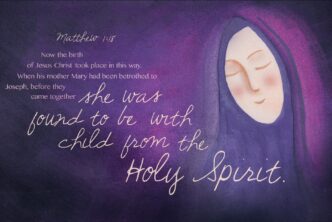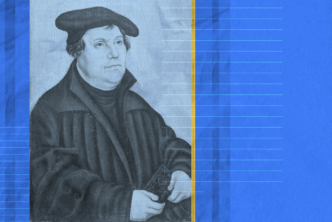I came to faith in Christ at the age of sixteen because two “church ladies” shared the gospel with me. As you can imagine, I am forever grateful Ann and Kathy took their faith seriously and taught me the basics. Soon after my conversion, I approached the youth pastor at my church to let him know I wanted to learn more about the Bible. Although it’s been twenty-five years since that conversation, I can still remember saying something like this to my youth pastor, “I don’t know the difference between Abraham and Moses. Where do I start?”
The year I became a Christian, the Holy Spirit ignited curiosity within me, especially regarding the characters in the Bible. Thankfully, I now recognize the main characters in Scripture and have discovered fascinating connections between figures from the Old and New Testaments. One connection in particular that captures my attention is the link between Jesus and Moses. Both Jesus and Moses have miraculous birth stories and deliverance ministries, and both arbitrate God’s laws through covenants.
Modern readers will find the connections between Jesus and Moses interesting (if they are noticed at all), but a first-century reader wouldn’t have been able to miss God’s intentional repurposing of Moses-like characteristics found in Jesus. Christ was the ultimate Moses.
Here’s what Moses and Jesus have in common.
1. A miraculous birth story
Moses’s birth signals the miraculous ways God set apart his life. Not even Pharaoh’s edict to kill all the firstborn Hebrew baby boys could keep Moses from fulfilling the calling on his life—to usher oppressed people into freedom. Between the midwife’s civil disobedience, Moses’s mother’s basket, his sister’s watchful eye, and the providence of Pharaoh’s daughter’s interest in the floating baby, it’s obvious that Moses was special. The unique and supernatural circumstances surrounding Jesus’s birth included prophetic dreams, angelic encounters, and the virgin birth. And what they have in common is that both Jesus and Moses faced threats from the governing rulers during their infancy and survived.
References: Exodus 1, Matthew 1, Luke 1
2. A deliverance ministry
As Tremper Longman III and Raymond B. Dillard have pointed out, the Exodus story is one of the most foundational in all of the Old Testament, as it narrates the “paradigmatic salvation event of ancient Israel.”1
The Exodus story was God’s greatest act of salvation in the Old Testament, and Moses was the leader of the movement. Moses led the Israelites out of Egyptian slavery and guided them through the wilderness for forty years, during most of which he was a faith-filled leader empowered by God to perform miracles and overpower enemies.
Jesus also came to deliver his people, all who would trust in him, but from a much more powerful enemy: the tyranny of sin. Although the bondage of brokenness didn’t involve chains during Jesus’s earthly ministry, the symbolism is clear: Jesus is another deliverer who saves his people from an even greater enemy, who pays an eternal price for freedom, and who secures that freedom through his death on the cross. Christ, the Great Liberator, inaugurates God’s redemption from the slavery of sin.
References: Exodus 19-20, Romans 8
3. Covenant mediation and lawgiving
Another connection between Jesus and Moses is their respective roles as arbiters of God’s laws. Moses mediated God’s Ten Commandments and the (Mosaic) covenant at Mt. Sinai. Jesus fulfilled the laws of God. In Matthew’s Gospel, the literary elements in the Sermon on the Mount scene echo Moses’s experience receiving the law (Exod 19–20). Both Jesus and Moses were on top of mountains, and both men explained God’s laws. But only one could fulfill them. Moses took his role as covenant mediator seriously and often interceded for the rebellious people. But only Jesus is the mediator of the New Covenant of grace. He is the only and ultimate intercessor.
References: Exodus 19-20, Matthew 5-8, Hebrews 10
4. Shepherds
After marrying Zipporah, Moses became the shepherd of his father-in-law’s flocks. I find it interesting that before Moses led the Hebrews from the clutches of Pharaoh, Moses was tending sheep and keeping watch over his flock.
Although Christ was a craftsman for a living, he referred to himself as the Good Shepherd: the Shepherd Israel had been waiting for, the one who would walk the valley of the shadow of death on his way to the cross and resurrect from a metaphorical valley of dry bones to become an even better shepherd than Moses.
References: Exodus 3, John 10
5. A cosmic water connection
Give me an hour, and I’ll detail several other ways Jesus is an “antitype” of Moses, a new and better Moses. But I think the last that occupies a lot of my brain-space is their connections to cosmic water events.
Many times throughout Scripture, God has used water to accomplish his will. God sent the great flood in Genesis, parted the Red Sea for Moses, and helped Joshua cross the Jordan River. In the New Testament, God clarifies that he is like a body of water that wells up within believers when Christ speaks with the woman at the well.
Moses witnessed God part the Red Sea (Sea of Reeds) and then the drowning of Pharaoh’s army. But Jesus is the Living Water.
References: Genesis 7, Exodus 14, Joshua 3, John 4, Revelation 22
Why it matters that Jesus is the new & better Moses
What can we do with all of these links between Moses and Jesus? We worship. We fix our thoughts on Jesus, the new and better Moses as the author of Hebrews suggests,
Therefore, holy brothers and sisters, who share in the heavenly calling, fix your thoughts on Jesus, whom we acknowledge as our apostle and high priest. He was faithful to the one who appointed him, just as Moses was faithful in all God’s house. Jesus has been found worthy of greater honor than Moses, just as the builder of a house has greater honor than the house itself. For every house is built by someone, but God is the builder of everything. “Moses was faithful as a servant in all God’s house,” bearing witness to what would be spoken by God in the future. But Christ is faithful as the Son over God’s house. And we are his house, if indeed we hold firmly to our confidence and the hope in which we glory. (Heb 3:1–6 NIV)
We appreciate Jesus as the miracle of miracles, the greatest deliverer, the fulfillment of the law, the Good Shepherd, and our Living Water. Moses was exceptional, but none compares with Jesus. He’s the Moses we’ve all been waiting for.
Books written or recommended by Kat Armstrong
No More Holding Back: Emboldening Women to Move Past Barriers, See Their Worth, and Serve God Everywhere
Regular price: $4.99
Mountains: Rediscovering Your Vision and Restoring Your Hope in God’s Presence
Regular price: $10.19
Valleys: Finding Courage, Conviction, and Confidence in Life’s Low Points
Regular price: $10.19
Sticks: Rooting Your Faith in Godly Wisdom When Your Decisions Matter the Most
Regular price: $10.19
Sinners: Experiencing Jesus’ Compassion in the Middle of Your Sin, Struggles, and Shame
Regular price: $10.19
Saints: Enjoying a Relationship with Jesus When You’re Disillusioned with Religion
Regular price: $10.19
Recommended articles
- Who Is Jesus? Answering Life’s Most Important Question
- What Did Mary Know? Quite a Bit, It Turns Out
- Was the Story of Moses Based on an Ancient Legend?
- Tremper Longman III and Raymond B. Dillard, An Introduction to the Old Testament, 2nd ed. (Grand Rapids, MI: Zondervan, 2006), 70.







